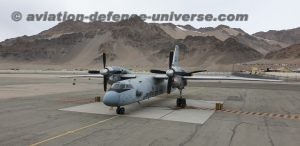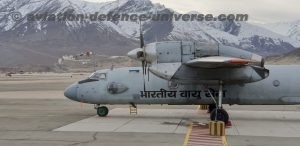
New Delhi, On 31 Jan 2020, IAF achieved another milestone, when an AN-32 aircraft of the Indian Air Force, powered with a 10% blend of Indian bio-jet fuel took-off from Kushok Bakula Rimpochee Airport, Leh. This is the first time that both engines of the aircraft were powered by the bio-jet indigenous fuel. The aircraft was flight tested and its performance was validated at Chandigarh Air Base prior to undertaking the operational flight to Leh.

Leh at an altitude of 10,682 ft above mean sea level, is amongst one of world’s highest and most difficult operational airfield, it is prone to extreme weather conditions. Even during clear weather conditions, landing and taking-off an aircraft at Leh, is challenging due to reduced power output of the aircraft engines in the rarefied atmosphere, turbulent wind conditions and proximity of mountainous terrain. Evaluating the performance of bio-jet fuel under these conditions is important from operational perspectives. It validates the capability of the aero-engine to operate smoothly with
bio-jet fuel at the extremities of the operational envelope. The tests were conducted by a team comprising of test pilots from the Aircraft and Systems Testing Establishment, Bengaluru and pilots from the operational squadrons.

This successful test flight also demonstrates IAF’s capabilities to absorb newer technology, while sponsoring indigenization. The technology to produce this fuel was developed by CSIR-IIP in 2013, but could not be tested and certified for commercial use due to lack of concurrent aviation test facilities in the country. In 2018, the IAF sponsored this project and channelized its human and material resources for the complete range of fuel testing.
Bio-jet fuel is produced from non-edible ‘Tree Borne Oils’, grown and procured from the tribal areas of Chhattisgarh state. IAF’s efforts would assist in reducing carbon footprint and India’s dependence on crude imports.
































































































































